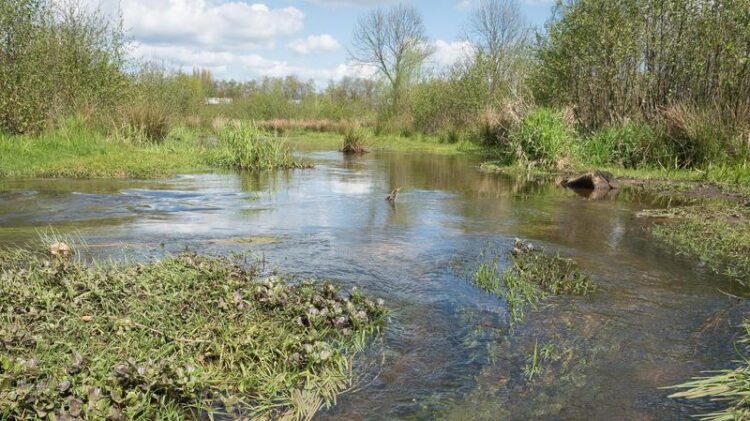Development of a Diagnostic Tool for Water Bodies: The River Doctor

River restoration at the Rotbach near Dinslaken, Germany
PD Dr. Christian K. Feld
Feld/UDE
Lack of shade? Too many nutrients from adjacent fields? Modified banks? If a river or stream is not doing well, there are many possible causes, but they are sometimes difficult to detect. Scientists from the University of Duisburg-Essen (UDE) have now developed a method that evaluates biological symptoms of rivers and calculates probable causes.
“Our tool works similar to a visit to the doctor, where they ask us ‘What’s wrong?'”, explains PD Dr. Christian Feld from Aquatic Ecology. But instead of the human body the biologists look at the biological symptoms of a body of water that can be “diseased”, such as the composition of aquatic insects, crayfish and mussels. For each species has different requirements regarding its habitat. Therefore, potential causes of deterioration such as temperature, oxygen depletion, flow alteration or poor habitat availability can be derived from the biological diversity.
Taking animal samples from streams and rivers and thereby evaluating the water quality is required by EU law and has hence been a standard practice in river management for nearly 20 years. But what to do if ecological quality targets are missed? Appropriate management options are often difficult to extract from the data.
The team led by Christian Feld now provides experts with a tool that offers decision support as to the main causes of deterioration: Once the biological symptoms of a river stretch are entered into the online mask, the program calculates the probability of potential causes such as the lack of shade or nutrient enrichment, and puts them into a hierarchical order. The tool also explains the background and gives tips on how to proceed.
“On this basis, ecosystem managers can make more informed decisions,” Feld explains.
The “Journal of Applied Ecology” currently reports on the helpful online tool.
Editor: Birte Vierjahn, +49 203/37 9-2427, birte.vierjahn@uni-due.de
Wissenschaftliche Ansprechpartner:
PD Dr. Christian K. Feld, Aquatic Ecology, +49 201/18 3-4390, christian.feld@uni-due.de
Originalpublikation:
Feld, C. K., Saeedghalati, M. & Hering, D. (2020): „A framework to diagnose the causes of river ecosystem deterioration using biological symptoms“. Journal of Applied Ecology. (DOI: 10.1111/1365-2664.13733)
Weitere Informationen:
http://www.freshwaterplatform.eu/index.php/mars-diagnostic-tools.html
https://www.uni-due.de/2020-09-07-ursachen-schlechter-wasserqualitaet-erkennen
Media Contact
All latest news from the category: Ecology, The Environment and Conservation
This complex theme deals primarily with interactions between organisms and the environmental factors that impact them, but to a greater extent between individual inanimate environmental factors.
innovations-report offers informative reports and articles on topics such as climate protection, landscape conservation, ecological systems, wildlife and nature parks and ecosystem efficiency and balance.
Newest articles

You are What You Eat—Stanford Study Links Fiber to Anti-Cancer Gene Modulation
The Fiber Gap: A Growing Concern in American Diets Fiber is well known to be an important part of a healthy diet, yet less than 10% of Americans eat the minimum recommended…

Trust Your Gut—RNA-Protein Discovery for Better Immunity
HIRI researchers uncover control mechanisms of polysaccharide utilization in Bacteroides thetaiotaomicron. Researchers at the Helmholtz Institute for RNA-based Infection Research (HIRI) and the Julius-Maximilians-Universität (JMU) in Würzburg have identified a…

ASXL1 Mutation: The Hidden Trigger Behind Blood Cancers and Inflammation
Scientists show how a mutated gene harms red and white blood cells. LA JOLLA, CA—Scientists at La Jolla Institute for Immunology (LJI) have discovered how a mutated gene kicks off…



